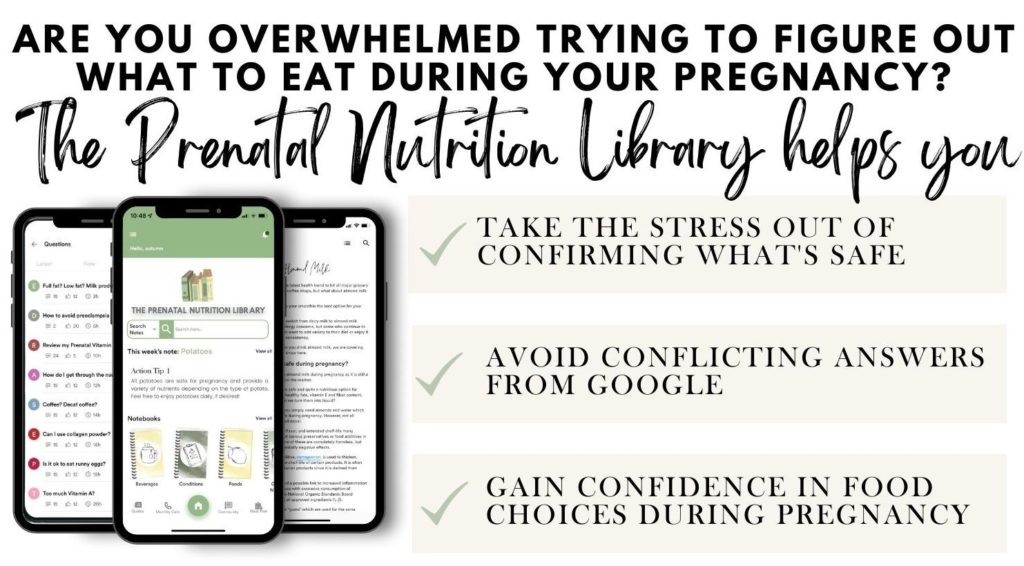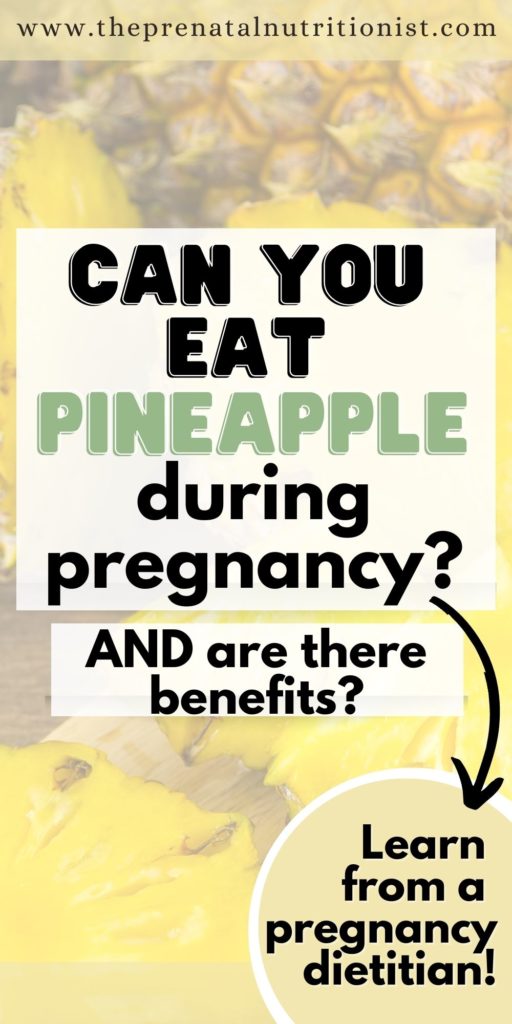
Nutrition is essential during pregnancy. It is a time when certain foods are recommended to be avoided either due to food safety risks or because they could cause harm to mom or baby. However, this “avoid list” is much smaller than most people are led to believe!
There are plenty of myths and opinions out there that make it even harder for pregnant women to know what’s true and what’s not about foods to avoid. I hope to clarify some of the confusion on one big pregnancy nutrition myth by dedicating this post to addressing whether or not eating pineapples during pregnancy is safe.

Can You Eat Pineapple While Pregnant?
Yes, pineapple is safe to eat during all trimesters of pregnancy.
According to one of the more common pregnancy food myths, when pregnant women eat pineapple, they’re putting themselves at risk for miscarriage. However, no scientific evidence supports the idea that consuming pineapple in normal food during pregnancy will cause miscarriage.
Pineapple contains a group of enzymes called bromelain, the part of pineapple that contributes to this myth. Bromelain is rumored to be dangerous for a pregnant woman because it is said that it causes uterine contractions or miscarriage. This is where the idea of using pineapple to induce labor after 40 weeks of pregnancy comes from.
So, what’s the truth?
Bromelain is a mixture of enzymes that digest protein. It is found in both the fruit and the stem of pineapple. But what does this have to do with eating pineapple during pregnancy?
Bromelain, particularly bromelain supplements containing large amounts of the enzyme, lacks safety data for pregnancy. However, the results of research studies suggest that the active part of pineapple juice, which is thought to lead to uterine contractions, is broken down by digestive enzymes when ingested orally. This means that pineapple is safe to consume in normal amounts during pregnancy.
Pineapple is a fantastic source of essential vitamins, minerals, and fiber that support a healthy pregnancy. Consuming pineapple in moderation is entirely safe during pregnancy.
**For clear, evidence-based answers to your pregnancy-related food questions, join The Prenatal Nutrition Library. Download the app for FREE in any app store to get a peek inside, and you’ll get a FREE 1-week meal plan for pregnancy!
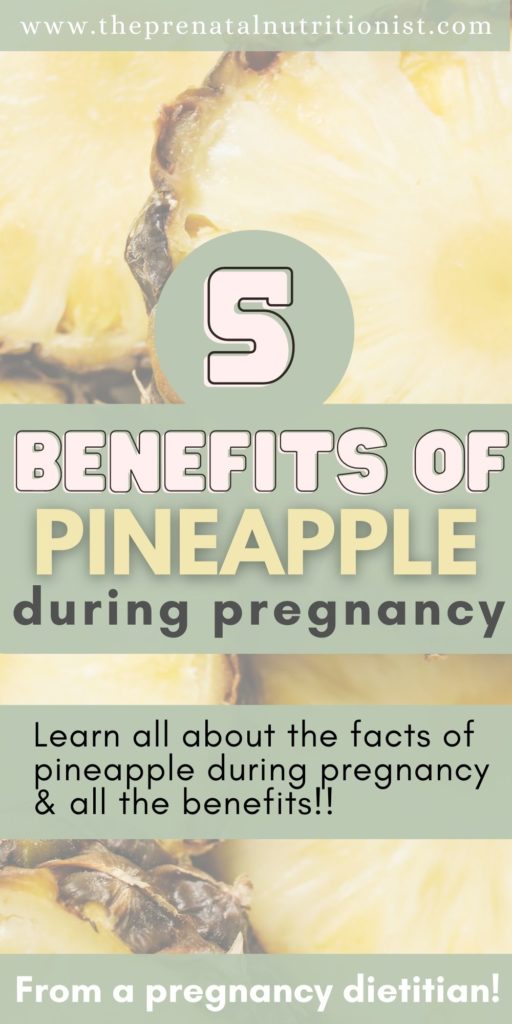
Benefits Of Pineapple During Pregnancy
Antioxidants
Pineapple is an excellent source of antioxidants due to its high amounts of vitamin C. Antioxidants benefit overall health and wellness. They help the body fight off infections and free radicals to stay healthy. While we know antioxidants are important for health in general, they have also been shown in research to provide benefits specifically for pregnancy.
Vitamin C
As mentioned above, pineapple has high levels of vitamin C. A single cup of pineapple contains almost all the daily vitamin C.
Vitamin C is vital to support a healthy immune system. It also plays an essential role in collagen synthesis, skin health, bone health, and improving the absorption of non-heme (plant-based) iron.
Some Non-Heme Iron, Folate, Vitamin B6, and Magnesium
Pineapple provides a bump of several other micronutrients, including non-heme iron, folate, vitamin B6, and magnesium. These nutrients are all essential during pregnancy. For example, iron plays a significant role in preventing pregnancy-related anemia.
Fiber
Both fresh and canned pineapple provide a decent boost of fiber. One cup of pineapple has about 2.5 grams of fiber. Fiber is essential during pregnancy to help prevent constipation and keep things moving.
Water and Hydration
Pineapple is a super hydrating fruit. The water in pineapple can up your fluid intake to play a role in preventing dehydration. Fluid needs increase during pregnancy, so it’s essential to prioritize hydration. Adequate fluids may also help reduce swelling in your legs and feet during pregnancy.
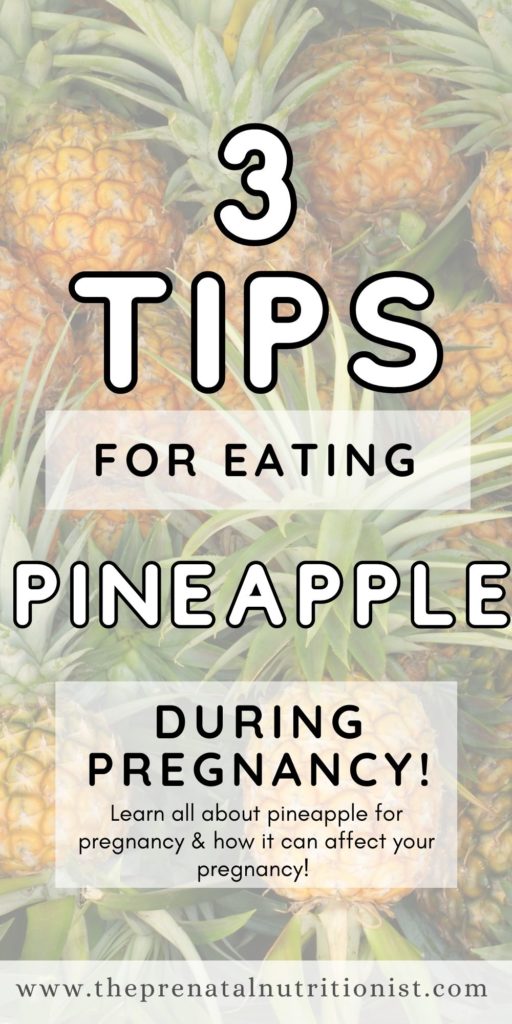
Tips For Eating Pineapple During Pregnancy
Gestational Diabetes
A single cup of pineapple contains around 16 grams of naturally-occurring sugars. Even though this is not added sugar, it will still raise blood sugar levels. We recommend everyone, but especially those with gestational diabetes, pair pineapple with protein and fats to support better blood sugar balance—for example, pineapple (carbohydrate) with full-fat cottage cheese (fat and protein).
Acid Reflux and Heartburn
The naturally sweet and tropical taste of pineapple is a common pregnancy craving. But because of its acidity, pineapple can trigger heartburn or reflux for some individuals. Heartburn is a common symptom during pregnancy and tends to become more prevalent in the third trimester as pregnancy progresses and the baby gets bigger.
If pineapple is one of your triggers, you may want to pass on this fruit or keep portions to a minimum to reduce this uncomfortable symptom.
Food Allergy to Pineapple
Although rare, some people are allergic to pineapple. Of course, to avoid a potentially life-threatening emergency, do not consume pineapple if you are allergic to this fruit.
Contact your doctor immediately if you experience any unexpected symptoms after eating pineapple, such as a burning, sore, or swollen tongue or itchy or swollen lips or throat. Call 9-1-1 if you experience symptoms of anaphylaxis, including coughing, wheezing, diarrhea, vomiting, or low blood pressure.
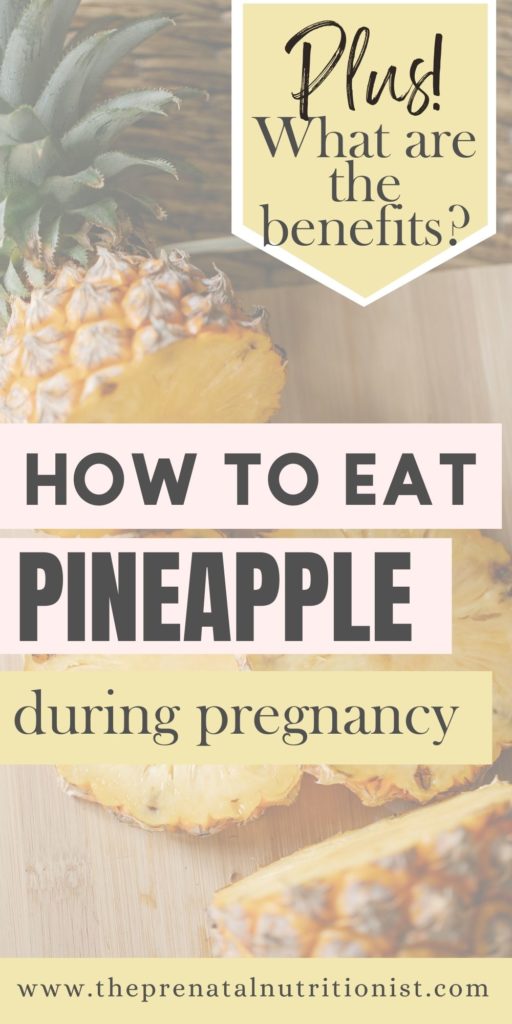
Tasty Ways To Eat Pineapple During Pregnancy
Pineapple is a flavorful fruit that makes a great addition to numerous pregnancy-safe snacks and meals. Some tasty ways to eat pineapple during pregnancy include:
- Add chunks of fresh pineapple to a cup of Greek yogurt
- Blend frozen pineapple into a fruit and protein smoothie
- Add chunks of pineapple to kebabs with meat and vegetables to grill
- Chop fresh pineapple and toss with red pepper, red onion, cilantro, and lime juice for an easy and delicious salsa
- Puree fresh pineapple and freeze it into ice pops
- Make a Hawaiian pizza with pineapple and ham
Check out my cookbook for more ways to add fresh fruits, vegetables, meat, seafood, and more to your pregnancy diet!
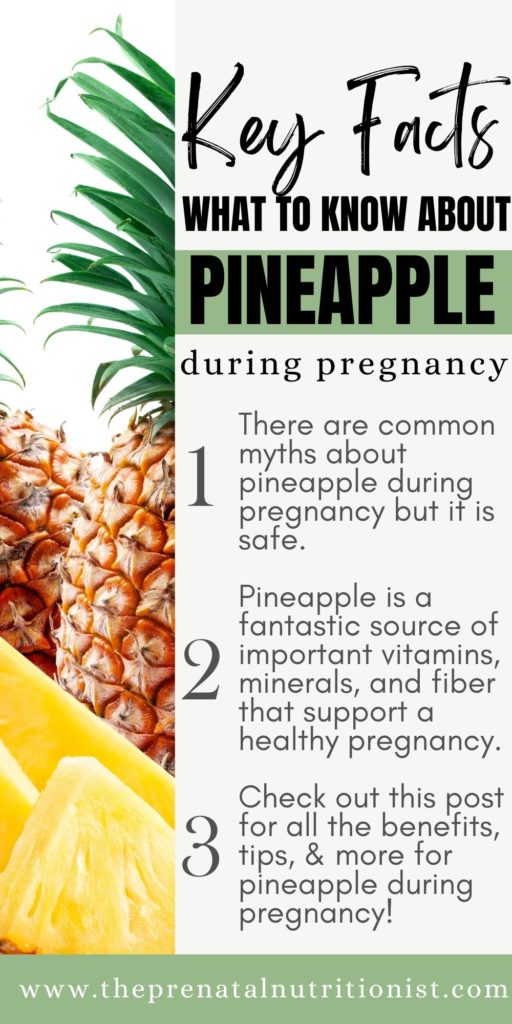
Pineapple is a flavorful and safe way to add essential nutrients and hydration to your pregnancy diet.
Despite an old wives’ tale that claims pineapple can cause early labor or miscarriage, consumption of this fruit is perfectly safe during pregnancy. Pineapple can be a sweet, flavorful, and healthy addition to a pregnant woman’s diet. Pair pineapple with protein and healthy fats and consume it in moderation to support optimal blood sugar balance.
For tips and guidance on how to find the most nutritious options for pregnancy when grocery shopping, head over to the blog and download The Prenatal Nutrition Library app on Apple or Android. The Prenatal Nutrition Library has 60-DAY meal plans for preconception through pregnancy (+ a 30-day gestational diabetes meal plan) to completely take the guesswork out of grocery shopping and planning for pregnancy.
